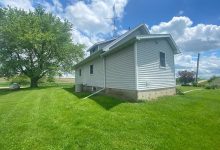House for Sale in Scotland: A Guide to Buying Your Dream Property
Advertisement
Scotland is known for its breathtaking landscapes, rich history, and vibrant culture. It comes as no surprise that many people dream of owning a house in this beautiful country. Whether you are a local looking to upgrade your current residence or an international buyer seeking a second home, the Scottish property market offers a wide range of options to suit every taste and budget. In this comprehensive guide, we will explore the process of buying a house in Scotland, the different types of properties available, and the advantages of investing in Scottish real estate.
The Scottish Property Market: An Overview
Before delving into the specifics of buying a house in Scotland, it is essential to understand the current state of the Scottish property market. Like many other countries, Scotland experienced a slowdown in the housing market during the global financial crisis of 2008. However, since then, the market has shown signs of recovery and growth.
In recent years, the demand for housing in Scotland has been steadily increasing, driven by factors such as population growth, low interest rates, and government initiatives to support first-time buyers. According to data from the Registers of Scotland, the average house price in Scotland reached £157,612 in 2020, an increase of 4.3% compared to the previous year.
It is important to note that the Scottish property market operates differently from the rest of the UK. While property sales in England and Wales are often handled by estate agents, in Scotland, the process is primarily managed by solicitors. Additionally, the legal framework and regulations surrounding property transactions in Scotland differ from those in other parts of the UK.
The Types of Properties Available in Scotland
Scotland offers a wide range of properties, from charming cottages in rural areas to modern apartments in bustling cities. Here are some of the most common types of properties you can find in the Scottish housing market:
- Detached Houses: Detached houses are standalone properties that offer privacy and space. They are often preferred by families or individuals seeking a larger living area and a private garden.
- Semi-Detached Houses: Semi-detached houses share a common wall with one neighboring property. They are a popular choice for families and offer a balance between space and affordability.
- Terraced Houses: Terraced houses are a row of properties joined together, typically sharing both side walls. They are common in urban areas and provide a cost-effective solution for those looking to live in the city.
- Flats/Apartments: Flats or apartments are self-contained units within a larger building. They are often found in city centers and offer a compact living space with amenities such as communal gardens or gyms.
- Bungalows: Bungalows are single-story properties that are highly sought after, especially by older buyers or those with mobility issues. They provide a convenient layout with all rooms on the same level.
When searching for a house in Scotland, it is important to consider your lifestyle, preferences, and budget. The Scottish property market caters to a diverse range of needs, ensuring there is something for everyone.
The Process of Buying a House in Scotland
Buying a house is a significant financial and emotional investment. Understanding the process of purchasing a property in Scotland is crucial to ensure a smooth and successful transaction. Here are the key steps involved:
1. Setting a Budget:
The first step in buying a house is determining your budget. Consider your financial situation, including your savings, income, and any mortgage options available to you. It is advisable to consult with a financial advisor or mortgage broker to assess your borrowing capacity and explore suitable financing options.
2. Property Search:
Once you have a clear budget in mind, it is time to start your property search. There are various avenues to find houses for sale in Scotland, including online property portals, local estate agents, and property auctions. Take the time to research different areas and consider factors such as proximity to amenities, transportation links, and future development plans.
3. Engaging a Solicitor:
In Scotland, the services of a solicitor are essential for buying a property. Solicitors play a crucial role in the transaction, including conducting searches, negotiating the purchase price, and overseeing the legal aspects of the sale. It is advisable to engage a solicitor with experience in property law to ensure a smooth and legally compliant process.
4. Viewing Properties:
Once you have identified potential properties, arrange viewings to assess their condition, layout, and suitability. Take note of any repairs or renovations that may be required and consider the additional costs involved. It is also advisable to visit the area at different times of the day to get a sense of its ambiance and any potential noise or traffic issues.
5. Making an Offer:
If you find a property that meets your requirements, it is time to make an offer. Your solicitor will guide you through the process and advise on the appropriate offer amount. It is common practice in Scotland to submit offers over the asking price, as properties often attract multiple bidders. The seller can either accept your offer, reject it, or enter into a negotiation process.
6. Conveyancing:
Once your offer is accepted, the conveyancing process begins. Conveyancing involves transferring the legal title of the property from the seller to the buyer. Your solicitor will handle all the necessary paperwork, including conducting searches, reviewing the title deeds, and preparing the contract of sale.
7. Home Report:
In Scotland, sellers are required to provide a Home Report to potential buyers. The Home Report includes an energy performance certificate, a property questionnaire, and a survey or valuation report. It is essential to review the Home Report carefully to ensure you have a comprehensive understanding of the property’s condition and any potential issues.
8. Mortgage Approval:
If you require a mortgage to finance the purchase, you will need to obtain a mortgage offer from a lender. The lender will assess your financial circumstances and the property’s value to determine the loan amount and interest rate. It is advisable to seek mortgage advice from a qualified professional to explore suitable options and ensure a competitive rate.
9. Completion and Settlement:
Once all the legal and financial aspects are in order, the sale can proceed to completion. On the agreed-upon date, the balance of the purchase price is transferred to the seller, and the legal ownership of the property is transferred to the buyer. Your solicitor will handle the necessary paperwork and ensure a smooth settlement process.
Advantages of Investing in Scottish Real Estate
Investing in Scottish real estate offers numerous advantages, making it an attractive option for both local and international buyers. Here are some key benefits:
- Affordability: Compared to many other parts of the UK, Scotland offers more affordable property prices. This affordability allows buyers to get more value for their money and potentially invest in larger or more desirable properties.
- Rental Potential: The demand for rental properties in Scotland is strong, particularly in major cities such as Edinburgh and Glasgow. This makes Scottish real estate an appealing option for buy-to-let investors looking to generate rental income.
- High Rental Yields: Scottish properties often offer higher rental yields compared to other parts of the UK. This means that investors can generate a higher return on their investment through rental income.
- Stable Market: The Scottish property market has shown resilience and stability over the years. While there may be fluctuations in prices, the long-term trend has been positive, making it a relatively safe investment option.
- Scenic Locations: Scotland is renowned for its stunning landscapes, from picturesque lochs to majestic mountains. Owning a property in Scotland allows you to enjoy these natural wonders on your doorstep.
It is important to conduct thorough research and seek professional advice before investing in Scottish real estate. Consider factors such as market trends, rental demand, and the potential for capital growth to make an informed decision.
Conclusion
Buying a house in Scotland can be a rewarding and life-changing experience. From the diverse range of properties available to the advantages of investing in Scottish real estate, there are plenty of reasons to consider purchasing a property in this beautiful country. Remember to engage a solicitor with experience in Scottish property law, conduct thorough research, and seek professional advice to ensure a smooth and successful transaction. With careful planning and the right resources, you can find your dream house in Scotland and embark on a new chapter of your life.
FAQs After The Conclusion
1. Can foreigners buy property in Scotland?
Yes, foreigners can buy property in Scotland. There are no restrictions on non-UK residents owning property in Scotland.
2. Are there any additional costs when buying a house in Scotland?
Yes, there are additional costs to consider when buying a house in Scotland. These may include solicitor fees, stamp duty (known as Land and Buildings Transaction Tax in Scotland), survey costs, and mortgage arrangement fees.
3. How long does the buying process take in Scotland?
The buying process in Scotland can vary depending on various factors, such as the complexity of the transaction and the efficiency of the parties involved. On average, it can take anywhere from 8 to 12 weeks from the acceptance of an offer to the completion of the sale. However, it is important to note that this timeline can be longer if there are any complications or delays along the way.
4. What is the Land and Buildings Transaction Tax (LBTT) in Scotland?
The Land and Buildings Transaction Tax (LBTT) is a tax that buyers must pay when purchasing a property in Scotland. The amount of LBTT payable is based on the purchase price of the property. There are different bands and rates for different purchase price ranges. It is important to factor in the cost of LBTT when budgeting for your property purchase in Scotland.
5. Are there any incentives or government schemes to assist first-time buyers in Scotland?
Yes, there are several government schemes and incentives available to assist first-time buyers in Scotland. The most notable one is the First Home Fund, which provides interest-free equity loans of up to £25,000 to help first-time buyers with their property purchase. There are also other schemes such as Help to Buy Scotland and the Scottish Government’s Low-Cost Initiative for First-Time Buyers (LIFT) that offer support and financial assistance to first-time buyers.
Summary
Buying a house in Scotland offers a unique opportunity to own a property in one of the most picturesque and culturally rich countries in the world. With a diverse range of properties available, from traditional cottages to modern apartments, there is something to suit every taste and budget. The Scottish property market has shown resilience and stability, making it an attractive option for both local and international buyers.
The process of buying a house in Scotland involves setting a budget, conducting a property search, engaging a solicitor, viewing properties, making an offer, and completing the necessary legal and financial procedures. It is important to seek professional advice and conduct thorough research to ensure a smooth and successful transaction.
Investing in Scottish real estate offers numerous advantages, including affordability, high rental potential, and the beauty of Scotland’s scenic locations. However, it is important to carefully consider market trends and seek professional advice before making an investment decision.
Whether you are looking for a family home, a vacation property, or an investment opportunity, the Scottish property market has much to offer. With the right guidance and resources, you can find your dream house in Scotland and enjoy the many wonders this country has to offer.


